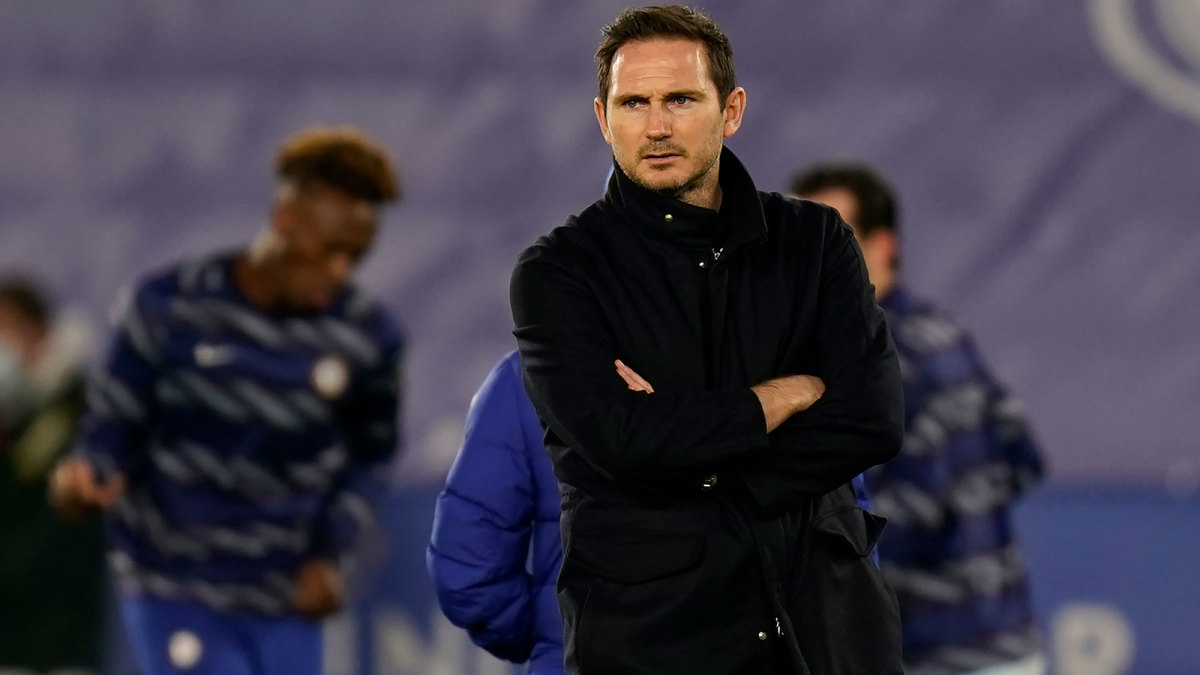Chelsea Left With No Choice but to Fire Frank Lampard
Eighteen months after it began, Frank Lampard’s career as Chelsea manager is over. Former Borussia Dortmund and Paris Saint-Germain manager Thomas Tuchel is lined up as a probable replacement. Lampard, fired Monday, leaves with the club ninth in the Premier League table, 11 points off the top, with the lowest win percentage of any permanent Chelsea manager in the Roman Abramovich era other than André Villas-Boas. No Chelsea manager since Ruud Gullit, who left in February 1998, has conceded more goals per game. In hindsight, the only question can be why somebody so inexperienced was ever given the job.
Lampard had had just one year in management, leading Derby County into the second-tier Championship promotion playoffs final, and his appointment at Stamford Bridge seemed one based on emotion and his status as a club legend as much as his résumé. Appointments made through sentiment and hope, though, rarely succeed. Pep Guardiola’s reign at Barcelona stands as the supreme example of a manager steeped in the history and culture of the club succeeding, but there are very few cases like his.
"We are grateful to Frank for what he has achieved in his time as head coach of the club," Chelsea wrote in a statement. "However, recent results and performances have not met the club’s expectations, leaving the club mid-table without any clear path to sustained improvement.
"There can never be a good time to part ways with a club legend such as Frank, but after lengthy deliberation and consideration it was decided a change is needed now to give the club time to improve performances and results this season."
For all the mitigating circumstances last season—the transfer ban, the sale of Eden Hazard, Kepa Arrizabalaga’s loss of confidence—and the way Lampard promoted youth, notably Mason Mount, Tammy Abraham and Reece James, there was no concrete evidence he was up to the job. Chelsea finished fourth, a position lower than it had the previous season when it had also won the Europa League, and with six points fewer. Most alarming of all, perhaps, was a defense that leaked 54 goals, Chelsea’s worst record in 23 years.
A high proportion of those goals came from counterattacks and set plays, two areas that are improved by rigorous work on the training ground. At Derby, similarly, defending transitions had been a problem, as no side in the Championship conceded a higher proportion of goals on the break.
The summer arrival of Thiago Silva has made Chelsea a little better in the air at the back this season, but Leicester City’s opener last Tuesday resulted from a short corner. Afterwards, James Maddison noted matter-of-factly that Leicester, which had not previously scored from a corner this season, knew that Chelsea had a tendency to switch off at set plays. Perhaps that is evidence of the problems of attitude Lampard has been so quick of late to criticize, but at some point that comes back to the manager and his capacity to motivate.
A $300 million transfer splurge in the summer removed the excuses. Chelsea’s squad is now, on paper, one of the best in Europe. There are still those who would defend Lampard and say he needs time to find his best formation and let the new players bed in, but patience has rarely been a feature of Chelsea under Abramovich. Lampard is only the second manager since Abramovich bought the club in 2003 not to be sacked after failing to win the league following a full season in charge. The first was José Mourinho, who had won two league titles (and was a previous Champions League winner)—and even he was sacked in September of the following season.

Neither of the two most expensive signings, Kai Havertz and Timo Werner, has settled. Havertz is only 21 and missed a portion of the season with COVID-19, but there has been no consistency with how either has been used. There was never any sense that Lampard had a clear plan. The incoherence that had plagued the defense has spread to the forward line. Senior figures in the club hierarchy seemed to have begun to doubt Lampard’s training methods and general tactical acumen.
As results have gone awry over the past month with five defeats in eight league games, Lampard has repeatedly criticized his players. There has been a consistent effort to deflect blame. That is always a risky ploy. While it can provoke a response, it can also lead to resentment if players believe a manager has begun to protect his own reputation.
A trend of Lampard’s management is how often players have gotten in a poor run of form and then gotten worse, as though he is unable to restore confidence in those who have begun to doubt themselves. It happened most obviously with Kepa, but also with Marcos Alonso, David Luiz, N’Golo Kante, Antonio Rudiger and now Havertz and Werner.
At the same time, his prickliness has led to spats with Jurgen Klopp and Marcelo Bielsa before last week, when Lampard attacked a journalist in a press conference for a piece he had written pointing out some flaws in Chelsea’s defeat to Leicester. The suggestion is of somebody temperamentally unsuited to management—and if he has no grand tactical plan either and cannot organize a defense, then there’s not much left.
Perhaps Lampard will go on to have a successful managerial career. Perhaps this experience will offer vital lessons. But he never looked ready for a job of this magnitude, and the defeat at Leicester only confirmed an end that had been long anticipated.
